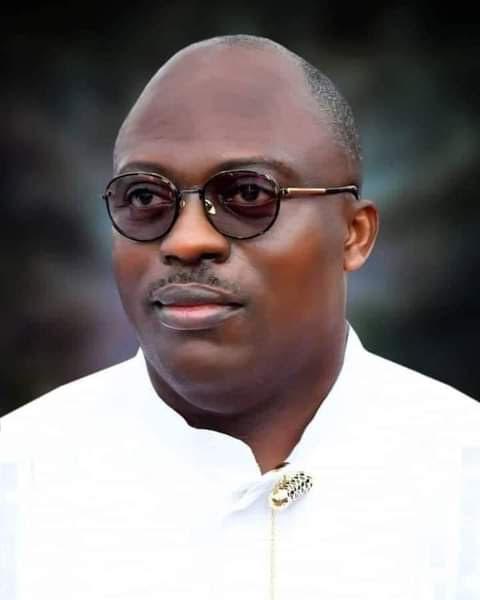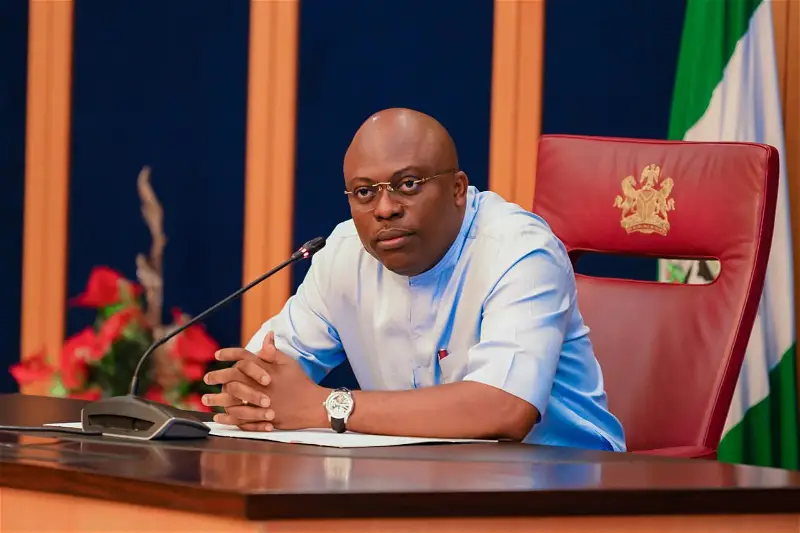Politics
Ekiti Election Characterised By Vote-buying, Daylight Robbery – IPAC

The Inter-Party Advisory Council on Wednesday expressed displeasure over the just concluded Ekiti State election, which it said, was a daylight robbery and a slap on democracy.
The council almost disclosed that its observation team witnessed a brazen act of vote-buying by agents of political parties while officials of the Independent National Electoral Commission and security agents look the other way.
The concerns were raised by the National Chairman of the Inter-Party Advisory Council, Yabagi Yusuf Sani, at the council’s national secretariat, Abuja on Wednesday.
Sani said, “Sadly, the election was a daylight robbery characterized by brazen and outrageous vote buying, sundry electoral malpractices and voter apathy thereby putting in question the legality of the process leading to declaration of Biodun Oyebanji, the candidate of the ruling All Progressives Congress as the winner.
READ ALSO: Ekiti Election: British High Commission Reacts
“It is obvious that the voters who sold their ballots for a mess of electoral porridge have inadvertently mortgaged their future for the next four years by electing a leader who may not have necessarily been their choice if the election were to be devoid of obscene use of money to induce voters,” he said.
According to him, the ugly Ekiti episode has eroded the value of the hard work by INEC, which also has inadvertently affected the perception of the citizens as to the capacity of the commission to conduct and ensure credible election results.
The IPAC chairman also urged the commission to meticulously evaluate its performance in Ekiti with a view to improving in the forthcoming Osun State governorship election, adding every vote must count and be counted in the overall result without inducement of the electorate.
He noted that the council was initially optimistic that with improved technology, particularly the deployment of the Bimodal Voter Accreditation System for verification, accreditation and confirmation of eligible voters, the gubernatorial election would be credible even with adequate security agents and operatives of the Economic and Financial Crimes Commission at strategic locations in the State.
“Sadly, it didn’t turn out as expected. The IPAC is deeply saddened and worried about the ugly high incidence of vote-trading between electorates and political actors in open connivance with some security agents saddled with the responsibility of arresting and prosecuting electoral offenders and their sponsors.
READ ALSO: Ekiti Election: APC Mocks PDP For Dismal Performance
“This unfortunate vicious circle of electing leaders after inducement has been the bane of the nation’s democracy since Independence in 1960, particularly since the return of democracy in 1999.
“Election is the beauty of democracy, the ballot is sacrosanct and should not be traded on for any reason or for no reason whatsoever. The destinies of millions of fellow compatriots are at stake when the will and mandate of the people is brazenly stolen through vote-buying by political buccaneers masquerading as democrats with a mission to loot our common patrimony,” he said.
Politics
PDP Reacts To Fubara’s Defection To APC

The Kabiru Turaki-led Peoples Democratic Party (PDP) has reacted to the defection of Rivers State Governor, Siminalayi FubaraGovernor, Siminalayi Fubara, to the ruling All Progressives Congress (APC), describing the move as a “self-inflicted injury” and a culmination of choices the governor “willingly embraced.”
Fubara on Tuesday defected from the PDP to the ruling APC.
He announced his decision during a stakeholders’ meeting held at the Government House in Port Harcourt on Tuesday. Fubara joins several of his colleagues who have also switched to the APC this year.
Recently, 17 members of the House of Assembly, loyal to former Governor Nyesom Wike and led by Speaker Martin Amaewhule, announced their defection from the PDP to the APC, thereby altering the balance of power in the legislature.
READ ALSO:JUST IN: Fubara Dumps PDP For APC
In a statement issued Tuesday night by National Publicity Secretary, Ini Ememobong, the PDP said Fubara’s exit merely affirmed the legal maxim volenti non fit injuria—”to one who is willing, no harm is done.”
According to the PDP, the governor’s political troubles and eventual departure were products of his own decisions.
“Everyone who has followed developments that culminated in this uneventful defection will recall that the Governor willingly travelled the path that took him to this destination,” the statement read.
“Having done so voluntarily, he cannot turn around and accuse our party or any person or group of failing to protect him.”
The party insisted that at every stage of the crisis that engulfed Rivers politics over the past year, civil society groups, democratic actors and Nigerians across political divides stood in Fubara’s defence until he “capitulated.”
READ ALSO:Fubara Names New Rivers SSG
It added that rather than blame others, the governor should acknowledge the support he enjoyed before choosing his new path.
Expressing concern about what it described as Fubara’s political capitulation, the PDP warned against the “Stockholm Syndrome”, a condition in which a victim develops affection for their oppressor—suggesting that the governor may have succumbed to pressures from forces aligned with the Federal Government.
“In all, despite these, we pity the Governor and wish him well,” the party added.
READ ALSO:BREAKING: Gov Fubara Dissolves Rivers Pension Board
The PDP further used the development to highlight what it called the “dysfunctional nature of Nigeria’s democracy,” lamenting a political environment where individuals wield power beyond institutions and allegedly deploy federal might to overwhelm opponents.
It warned that such tendencies threaten democratic stability and should be condemned by all well-meaning Nigerians.
With Fubara’s defection, the opposition party renewed its accusation that the ruling APC is bent on creating a one-party state and shrinking Nigeria’s political space.
“Democracy is under severe attack,” the statement noted, urging Nigerians and the international community to resist what it called a slide toward electoral authoritarianism.
Politics
JUST IN: Fubara Dumps PDP For APC

Governor Siminalayi Fubara of Rivers State has defected to the All Progressives Congress, APC, dumping the Peoples Democratic Party, PDP.
Fubara announced this at a stakeholders meeting at the government house in Port Harcourt.
“We can’t support President (Tinubu) if we don’t fully identify with him, not just backyard support.
“Our decision this evening is that we are moving to the APC,” Fubara said as he announced his defection from the PDP to the APC.
READ ALSO:JUST IN: Tinubu Holds Closed-door Meeting With Rivers, Ebonyi Govs
The development comes amid political tension in the oil rich Niger Delta state.
Recall that President Bola Tinubu on Monday
held confidential discussions the with the Governor.
The engagement, held at the State House in Abuja, came against the backdrop of escalating political friction in Rivers State and ongoing uncertainties regarding Fubara’s standing within the PDP.
Politics
Tinubu, Six APC Governors Hold Closed-door Meeting At Aso Villa

President Bola Ahmed Tinubu on Monday met with six governors elected on the platform of the All Progressives Congress (APC) in a closed-door session at the State House, Abuja.
The purpose of the meeting was not immediately disclosed, and details of its agenda remained unclear at press time.
In attendance were governors Umar Namadi (Jigawa), Monday Okpebholo (Edo), Biodun Oyebanji (Ekiti), Usman Ododo (Kogi,) Aliyu Sokoto (Sokoto) and Dr. Nasir Idris (Kebbi), who arrived at the Presidential Villa separately.
The meeting, held in the President’s office, lasted almost two hours.
Although no Presidency official offered insight into the agenda, the consultations come amid rising security concerns across the country and ongoing political engagements within the ruling party.
The governors declined to speak to journalists after the meeting.
READ ALSO:JUST IN: Navy Officer Who Had Altercation With Wike Reportedly Escapes Assassination Attempt
President Tinubu has recently intensified his focus on national security by convening a series of high-level meetings involving key security stakeholders, including the service chiefs of the Army, Navy, and Air Force, as well as intelligence coordinators and senior officials from various security agencies.
This increased engagement comes in response to a worrying upsurge in banditry, kidnappings, and violent crimes that have spread across multiple regions, causing widespread public concern and escalating pressure on the federal government for urgent and effective intervention.
These strategic meetings, frequently conducted in secrecy to ensure confidentiality and candid discussion, have aimed to undertake a comprehensive review of ongoing security operations nationwide.
Discussions have prioritised enhancing coordination and communication among military, police, and intelligence units to foster a more unified and cohesive response to security challenges.
In addition, the sessions have explored innovative and tactical measures that leverage intelligence gathering, rapid deployment, and community engagement to dismantle criminal networks and restore order.
READ ALSO:JUST IN: Tinubu Holds Closed-door Meeting With Rivers, Ebonyi Govs
Throughout these consultations, President Tinubu has underscored that safeguarding the lives and property of Nigerians is paramount.
He has called on the security apparatus to move beyond reactive measures and adopt more preventive, intelligence-driven strategies that anticipate threats before they escalate.
The administration’s renewed approach signals a commitment to reinforcing national security architecture and improving the operational effectiveness of all agencies involved in the fight against crime and insurgency across Nigeria.
In other news, the National Security Adviser (NSA), Nuhu Ribadu, has expressed optimism that the security challenges – terrorism, banditry, kidnapping, and other violent crime – Nigeria has been facing for almost three decades now will be overcome.
READ ALSO:Tinubu Submits Fresh Ambassadorial List To Senate, Ibas, Dambazau Make Cut
The NSA described those behind the “painful and unnecessary” challenges as “evil” and vowed they would be defeated.
Ribadu made remarks during the opening of a one-day dialogue organised by the National Peace Committee, in partnership with the delegation of the European Union to Nigeria and the U.S., on “a whole-of-Society Approach to the Prevention of Violence and Conflict in Northern Nigeria,” on Thursday in Abuja.
“This (security challenges) also shall pass. We are going through tough times. This will also go.
“But it’s very, very painful, what we are going through. It’s unnecessary.
They are very unfair to us, those who are responsible for this. They are evil.
“But they will be defeated. It’s a matter of time, and peace will be restored. That one we can assure you. Because there are people who are working, not necessarily making noise.
“There are people who are making sacrifices. Every single day, we go to bury our own deaths. Painful as it is. But most people don’t talk. Sacrifice is ongoing,” the NSA said.

 News5 days ago
News5 days agoRufai Oseni Breaks Silence On Alleged Suspension From Arise TV

 Headline5 days ago
Headline5 days agoJUST IN: Soldiers Announce Military Takeover Of Govt In Benin Republic

 News5 days ago
News5 days agoOAU Unveils Seven-foot Bronze Statue Of Chief Obafemi Awolowo

 Politics4 days ago
Politics4 days agoJUST IN: Tinubu Holds Closed-door Meeting With Rivers, Ebonyi Govs

 News3 days ago
News3 days agoWhy My Lineage Qualifies Me For Awujale Throne — K1 De-Ultimate

 Politics3 days ago
Politics3 days agoTinubu, Six APC Governors Hold Closed-door Meeting At Aso Villa

 News5 days ago
News5 days agoWoman Taken For Dead Wakes Up Inside Coffin Few Minutes To Her Cremation

 Politics5 days ago
Politics5 days agoAmbassadorial Nominees: Ndume Asks Tinubu To Withdraw List

 News3 days ago
News3 days agoGroup Wants Edo AG Professorship Investigated

 News4 days ago
News4 days agoHow I and Obey’s Son Escaped Getting Caught In Benin’s Coup —Dele Momodu
























